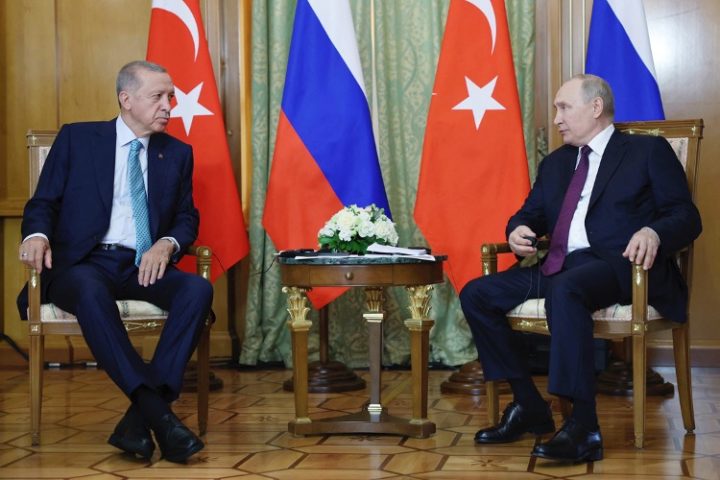
During a meeting with Russian President Vladimir Putin in Sochi on September 4, Turkish President Recep Tayyip Erdoğan highlighted the importance of using national currencies in bilateral trade with Russia.
“I believe that the fact that the heads of our central banks will meet here today is important from the point of view of a step towards the transition to national currencies in bilateral relations between us,” Erdoğan declared.
Putin, for his part, pointed out that the pace of bilateral trade development remained optimistic and that economic collaboration was extending beyond sectors such as energy and agriculture.
“We are very pleased that the volume of our bilateral trade is currently $62 billion, and we are moving towards our goal of $100 billion,” Erdoğan said.
Notwithstanding political differences, Moscow and Ankara have been seeking to bolster economic relations. For instance, April this year saw Putin and Erdoğan agreeing to boost mutual investments and help Russian and Turkish businesses successfully enter each other’s markets.
In June this year, data from the Turkish Institute of Statistics revealed that trade between Moscow and Ankara has continued to rise, with the volume of Russian goods exported reaching $4.17 billion in April.
The data showed that Russia was Türkiye’s primary supplier, contributing to almost 15 percent of the country’s total imports. Trailing behind Russia was China, Germany, Italy, and the United States, with the total share of Turkish imports from these countries totalling 44 percent in April.
Moreover, the same report disclosed that during the first four months of 2023, Türkiye imported Russian goods amounting to $17.2 billion. Putin also claimed that bilateral trade turnover in 2022 surpassed $62 billion.
In 2022, Türkiye and Russia inked an agreement for economic cooperation that hoped to propel bilateral trade to $100 billion annually. Besides, both countries have decided to use the Russian ruble as a settlement currency in bilateral trade, such as payment for Russian natural gas.
Data also divulged that last summer, Türkiye became one of the top five exporters to Russia, ranking 11th and surpassing the United States, France, Japan, Poland, and Italy in 2021.
In May this year, Turkish Foreign Minister Mevlüt Çavuşoğlu stated that Ankara does not intend to back Western-led economic sanctions against Russia.
The senior Turkish diplomat made the remarks to the Lider Haber TV channel before the country’s presidential and parliamentary elections that eventually saw Erdoğan emerging victorious.
“We are not going to join the unilateral sanctions imposed against Russia by the US and the EU. Our own benefit and prosperity come first,” Çavuşoğlu proclaimed, as cited by the Russian TASS news outlet.
Additionally, Çavuşoğlu slammed the opposition presidential candidate Kemal Kılıçdaroğlu, who has admitted that he would prioritize enhancing ties with the West rather than Russia instead.
Çavuşoğlu accused Kılıçdaroğlu of being inconsistent in his positions; at one pre-election rally, Kılıçdaroğlu supposedly assured his audience that nothing would undermine ties between Türkiye and Russia.
Reports emerged in March this year that Türkiye had obstructed some transit shipments heading toward Russia, following promises by Brussels and Washington to impose anti-Russian economic restrictions and to halt the supply of sanctioned products via third parties. While Türkiye’s Ministry of Trade did not offer any official authentication of these reports, it was subsequently reported that Ankara had resumed the transportation of some sanctioned goods of European origin to Russia.
The EU has constantly expressed its disapproval of Türkiye’s reluctance to join the West in enforcing sanctions against Russia, slamming the Islamic country for functioning as “transit hub” for Russia, enabling Russia to circumvent Western embargoes.
In an interview with the newspaper Habertürk, Çavuşoğlu also claimed that the United States had reached out to Türkiye to request that the country give Washington access to its Russian-made S-400 air-defense systems or send them to Ukraine.
Ankara refused the request, Çavuşoğlu continued.
The Turkish minister recalled how the United States had “made offers that directly concern our sovereignty, such as giving us control of [S-400], and giving it to somewhere else”, stating that Washington had proposed offering the air-defense systems to Ukraine, but that Ankara had rejected the suggestion.
Türkiye received the first batch of S-400s from Russia in 2019.
Regarding the possibility of Ankara’s return to Washington’s F-35 fighter jet program, Çavuşoğlu stated that Türkiye was no longer keen on it, as it is currently working on its own military aircraft.
Last March, various mainstream Western media outlets reported that the United States had offered Türkiye a “return to the F-35 program” in exchange for “giving up the S-400 system and sending it to Kyiv.”
Alluding to such allegations, Erdoğan clarified that Türkiye’s use of the S-400s was a “done deal for us.”
“They are our property serving our defense, so it’s over,” he emphasized at that time.
Erdoğan’s spokesman, Fahrettin Altun, highlighted that “what the West must do is deliver the F-35 fighter jets and Patriot batteries to Türkiye without preconditions.”
In 2020, Washington enforced sanctions on the Turkish defense industry and expelled the country from its F-35 fighter jet program over Ankara’s purchase of Russian military hardware.
The United States staunchly opposed delivering the already-ordered aircraft to Türkiye, a fellow NATO member, stating that Türkiye’s purchase of the Russian system “would endanger the security of US military technology.”
In recent statements to journalists on September 5, Erdoğan contended that it was unlikely that tensions between Ukraine and Russia would cease in the near future, adding that Ankara would persist in championing peace and negotiations.
On the flight back home after meeting Putin in Sochi, Erdoğan stated that Türkiye had made attempts to facilitate peace in Ukraine and that the country’s requests for peace remained the same since the Russo-Ukrainian conflict erupted in February 2022.
“Unfortunately, the war, which has been going on for a year and a half, is still going on,” Erdoğan lamented, elaborating that “there are no prospects on the horizon for achieving peace.”
Nevertheless, Erdoğan reinforced Ankara’s position that “there are no winners in war, and there are no losers in peace.”
“We are ready to do our part if the parties express such a desire. We will also continue to play the role of mediator in issues such as the exchange of prisoners and the Zaporizhzhia nuclear power plant,” Erdoğan said.
The Turkish leader voiced his hope that the conflict, which he said affected all countries involved and the region as a whole, would end as soon as possible in a “just and lasting peace based on international law.”
During his meeting with Putin, Erdoğan also declared that Türkiye was prepared to once again broker peace talks between Ukraine and Russia.
In response, Putin admitted that while Moscow has remained open to negotiations, it was Kyiv and its Western allies that have excluded possibilities for peace talks. The Russian leader pointed out that during the early months of the conflict, Russian and Ukrainian delegations had inked a number of agreements and signed draft documents, only for Kyiv to ultimately “send them to the dump.”
Putin also posited that Kyiv has since legally forbidden any talks with Moscow, with Ukrainian authoritarian leader Volodymyr Zelensky signing an official decree last fall criminalizing any talks with Russia as long as Putin was in charge.
Instead, Zelensky has been touting a so-called 10-point peace plan calling for Russia to withdraw to borders claimed by Kyiv, to foot the costs of reparations, and to comply with war crimes tribunals. Not surprisingly, Moscow has dismissed Kyiv’s proposal as “unrealistic.”



